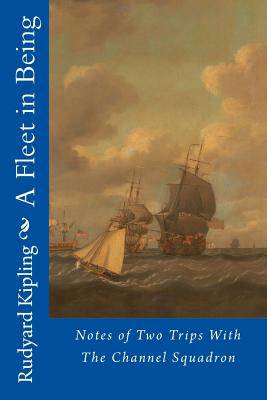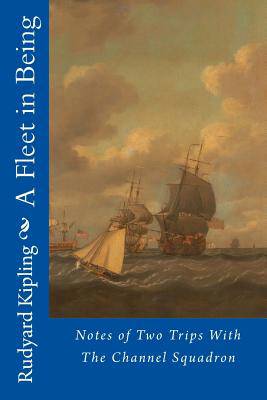
En raison d'une grêve chez bpost, votre commande pourrait être retardée. Vous avez besoin d’un livre rapidement ? Nos magasins vous accueillent à bras ouverts !
- Retrait gratuit dans votre magasin Club
- 7.000.000 titres dans notre catalogue
- Payer en toute sécurité
- Toujours un magasin près de chez vous
En raison de la grêve chez bpost, votre commande pourrait être retardée. Vous avez besoin d’un livre rapidement ? Nos magasins vous accueillent à bras ouverts !
- Retrait gratuit dans votre magasin Club
- 7.000.0000 titres dans notre catalogue
- Payer en toute sécurité
- Toujours un magasin près de chez vous
Description
A Fleet in Being is a classic sea adventure story by Rudyard Kipling. In naval warfare, a "fleet in being" is a naval force that extends a controlling influence without ever leaving port. Were the fleet to leave port and face the enemy, it might lose in battle and no longer influence the enemy's actions, but while it remains safely in port, the enemy is forced to continually deploy forces to guard against it.Joseph Rudyard Kipling (30 December 1865 - 18 January 1936)[1] was an English journalist, short-story writer, poet, and novelist. He was born in India, which inspired much of his work.Kipling's works of fiction include The Jungle Book (1894), Kim (1901), and many short stories, including "The Man Who Would Be King" (1888).[2] His poems include "Mandalay" (1890), "Gunga Din" (1890), "The Gods of the Copybook Headings" (1919), "The White Man's Burden" (1899), and "If-" (1910). He is regarded as a major innovator in the art of the short story;[3] his children's books are classics of children's literature, and one critic described his work as exhibiting "a versatile and luminous narrative gift". Kipling was one of the most popular writers in the United Kingdom, in both prose and verse, in the late 19th and early 20th centuries.[3]Henry James said: "Kipling strikes me personally as the most complete man of genius, as distinct from fine intelligence, that I have ever known."[3] In 1907, at the age of 41, he was awarded the Nobel Prize in Literature, making him the first English-language writer to receive the prize and its youngest recipient to date.[6] He was also sounded out for the British Poet Laureateship and on several occasions for a knighthood, both of which he declined.[7]Kipling's subsequent reputation has changed according to the political and social climate of the age[8][9] and the resulting contrasting views about him continued for much of the 20th century.[10][11] George Orwell saw Kipling as "a jingo imperialist", who was "morally insensitive and aesthetically disgusting".[12] Literary critic Douglas Kerr wrote: "[Kipling] is still an author who can inspire passionate disagreement and his place in literary and cultural history is far from settled. But as the age of the European empires recedes, he is recognised as an incomparable, if controversial, interpreter of how empire was experienced. That, and an increasing recognition of his extraordinary narrative gifts, make him a force to be reckoned with.In 2010, the International Astronomical Union approved that a crater on the planet Mercury would be named after Kipling-one of ten newly discovered impact craters observed by the MESSENGER spacecraft in 2008-9.[117] In 2012, an extinct species of crocodile, Goniopholis kiplingi, was named in his honour, "in recognition for his enthusiasm for natural sciences".More than 50 unpublished poems by Kipling, discovered by the American scholar Thomas Pinney, were released for the first time in March 2013.[119]Kipling's writing has strongly influenced other writers. Kipling's stories for adults remain in print and have garnered high praise from writers as different as Poul Anderson, Jorge Luis Borges, and Randall Jarrell who wrote that, "After you have read Kipling's fifty or seventy-five best stories you realize that few men have written this many stories of this much merit, and that very few have written more and better stories." His children's stories remain popular, and his Jungle Books have been made into several movies. The first was made by producer Alexander Korda, and other films have been produced by The Walt Disney Company. A number of his poems were set to music by Percy Grainger. A series of short films based on some of his stories was broadcast by the BBC in 1964. Kipling's work is still popular today.
Spécifications
Parties prenantes
- Auteur(s) :
- Editeur:
Contenu
- Nombre de pages :
- 64
- Langue:
- Anglais
Caractéristiques
- EAN:
- 9781500315283
- Date de parution :
- 25-06-14
- Format:
- Livre broché
- Format numérique:
- Trade paperback (VS)
- Dimensions :
- 152 mm x 229 mm
- Poids :
- 99 g

Les avis
Nous publions uniquement les avis qui respectent les conditions requises. Consultez nos conditions pour les avis.






